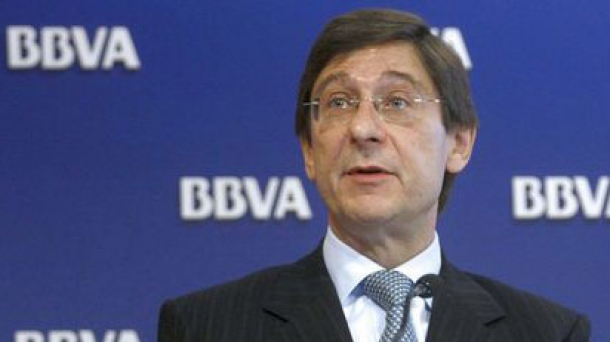news
Spanish Bank
Jose Ignacio Goirigolzarri will replace Rato as Bankia chief
Reuters
Madrid
Rato's departure helps to clear the way for a rescue plan that the government hopes will persuade international investors of the country's financial stability.
-

Jose Ignacio Goirigolzarri a former chief executive of major Spanish bank BBVA. Photo: EFE
Jose Ignacio Goirigolzarri a former chief executive of major Spanish bank BBVA will replace Rodrigo Rato as chief of the ailing Spanish lender Bankia after Rato stepped down on Monday.
Rato's departure helps to clear the way for a rescue plan that the government hopes will persuade international investors of the country's financial stability.
The former IMF chief departed from Bankia as Prime Minister Mariano Rajoy opened the door to using public funds for helping troubled banks, after previously ruling this out, striving to overhaul a sector that threatens the country's finances and ultimately the euro zone.
"If it were necessary to get the credit to save the Spanish financial system I would not hold back from doing what other European Union countries have done - loan them public money - but it would only be as a last resort," Rajoy said in a radio interview on Monday.
Rajoy did not mention Bankia, but two sources said the state will provide 7 billion to 10 billion euros in aid to the lender, which is saddled with toxic real estate assets that put it at the heart of concerns about the cost of a Spanish bank bailout.
Bankia chief Rato, who is also a former minister for the ruling centre-right People's Party (PP), was asked to stand down so that the rescue would not seem like a PP favor for a political ally, one of the sources said.
Two government sources said state money would be injected into Bankia - an agglomeration of local savings banks or "cajas" - through the purchase of bonds known as CoCos, or contingent convertibles, that can be converted into shares.
The maneuver may increase Spain's public debt-to-GDP level this year, as the government would have to raise debt to buy the Bankia bonds. But since Bankia has to pay back the CoCos at market rates, it would not be calculated as spending that weighs on the public deficit.
Highly exposed
Cash from the CoCos would be used to clean up the banking and real estate activities currently held by Bankia's parent group BFA. These activities would then be absorbed by Bankia and BFA would stop operating as a bank, one source said.
The move aims to clarify the group's structure and reassure investors that the bank - which holds around 10 percent of Spanish deposits - won't push Spain to seek an Irish-style international bailout to recapitalize its lenders.
Bankia is Spain's fourth biggest bank by assets and has already received more than 4 billion euros in government aid. Bankia and BFA are together the most exposed of any Spanish lender to troubled real estate assets, with 31.7 billion euros of exposure compared with a sector total of 184 billion euros.
Bankia and BFA have recognized losses of 37.5 percent or 11.9 billion euros, on these assets, which include loans to property developers as well as property that was collateral on loans that went bad. But many banking analysts say the losses could go deeper.
The fresh injection of up to 10 billion euros will allow Bankia to clean up troubled assets, cushion against further losses in the future and also meet European banking capital standards for solvency, the sources said.
Sources said a government announcement on Bankia could come on Friday once Rato's successor is in place. "The objective is to send a strong signal to the markets and also to the International Monetary Fund and other international partners that the (Bankia) plan is ambitious and strong and will complete our ongoing banking reform," one of the sources said.
The Bankia rescue will dovetail with a wider plan to create a so-called bad bank to park and eventually sell off toxic real estate assets held by the banks. Rajoy said he would announce the details of the wider bank reform scheme on Friday. The Bank of Spain and Bankia declined to comment.
top stories



-
news
New anti-eviction law
Andalucia begins proceedings to seize confiscated houses from banks
-
news
London attack
British police ponder conspiracy after soldier murder
-
Sport
Giro d'Italia
Nibali tightens grip on overall lead after stage victory
-
Sport
Spanish soccer league
Real Sociedad, Valencia resume duel for last Champions League ticket
-
Sport
Giro d'Italia
Nibali tightens grip on overall lead after stage victory
© EITB - 2024 - Privacy Policy - Legal disclaimer - Cookie Policy - Cookie settings


